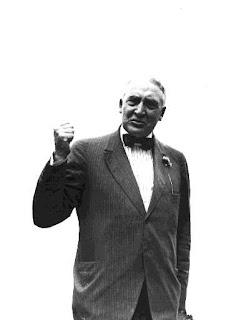
Seven come eleven
Daddy needs a new
pair of shoes.
Lately I have been on a biography kick. My reading habits are thus that I get interested in one topic or genre and keep seeking it out until I find something else to entertain and/or inform me.
Biographies, good biographies that is, can transform you back to that time or place even when put into the context and language of the present. A good example is “Mark Twain: A Life,” written by Ron Powers, who penned “Flags of our Fathers.”
Not only did Powers take me back on the amazing journey that was Mark Twain’s life — warts, ups, downs and all — but that author did so quite often using a 21st-century voice.
Interestingly enough, although I have always admired Twain’s writing and to some extent, the way he tackled life, I was pulled into the world of Sam Clemens once again because of an earlier biography I read about President Ulysses S. Grant. That book told of how Clemens, who initially was sympathetic with the South and then went West to avoid the whole war altogether, later encouraged and enabled Grant to write his own biography. Grant did so, in a race against the clock with terminal cancer and dying penniless on his tail.
Now I am reading a Warren G. Harding biography: “The Shadow of Blooming Grove,” a work published in 1968 by Russell Francis.
The first question I can imagine someone asking after reading the above paragraph is: why? Before George “Gee Dubya” W. Bush, Harding had long been thought of as possibly the worst president ever. Even dying in office didn’t improve his standing in history. Much of that was due to the Teapot Dome and other scandals that riddled the Harding administration. This is even though Russell, who pulls no punches about the good and bad of this Buckeye State native, felt Harding himself to be an extremely honest guy. Of course, I am skeptical because Harding made his bones before becoming a politician as a newspaper publisher and secondly because he was a politician.
Although I am early into Harding’s life, the most interesting aspect I have been reading so far is of the whispers and speculations floating about Warren G. Harding and his family that the family’s blood was partly that of the “Negro” race.
It wouldn’t be too much of a strech to say some politicians today might wish (for gaining the so-called “black” vote) their ancestry included that of African descent, as it wasn’t desirable for white people in the post Civil War era to be identified as of another race, especially being black. As most who know a smidgen of history will understand as well, such sentiments were as prevalent in the America’s “Heartland” of Ohio as they were in Georgia or Mississippi.
What is amazing is that the Hardings would be pummelled in print by rival publishers who accused them of being black. Warren Harding’s father, a physician, especially would get offended by such accusations and result to violence involving fisticuffs and knives.
Perhaps these speculations, whether real or imagined, are something I had previously learned at some point in college. But I don’t think so. At least I don’t remember ever reading that people suspected Harding of being our first black president. An any case, it is good to know such information exists because one doesn’t learn everything in school. So I can go with a good conscience saying that my reading habits — at least in this instance — are worthwhile. Sometimes those habits are not always of such value.
